The changing social and economic picture
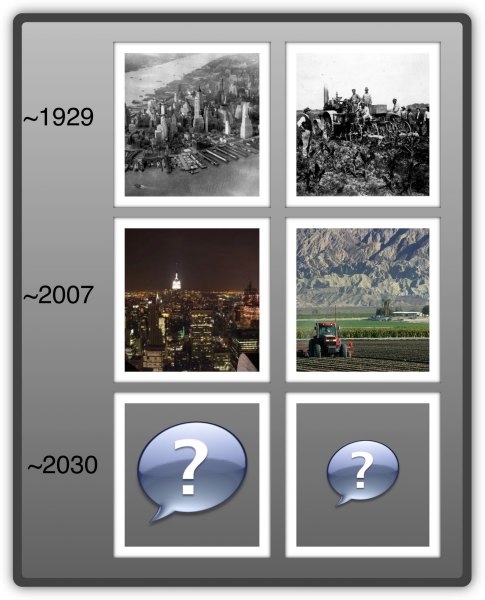
Larger
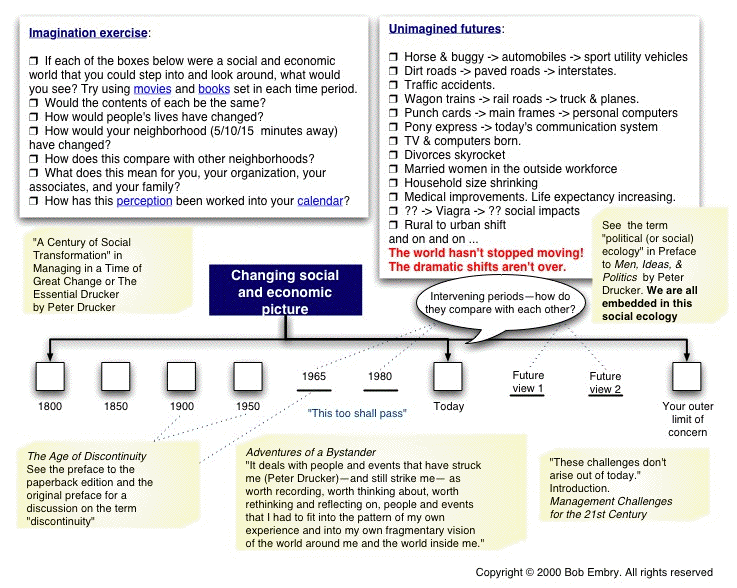
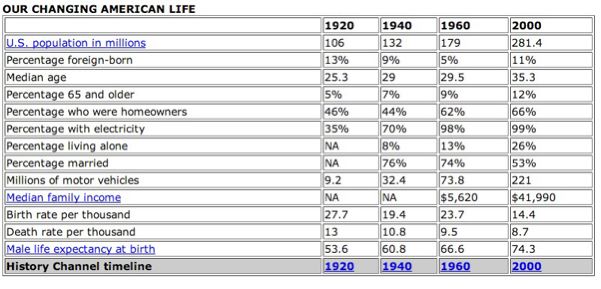
Following is from Post-Capitalist Society by Peter Drucker
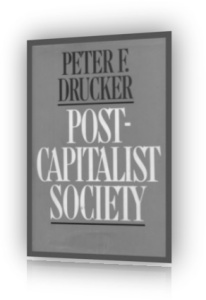
Amazon link: Post-Capitalist Society

“EVERY FEW HUNDRED YEARS in Western history there occurs a sharp transformation.
We cross what in an earlier book (The New Realities—1989) I called a “divide.”
Within a few short decades, society rearranges itself—its worldview; its basic values; its social and political structure; its arts; its key institutions.
(Can you identify what these components might be?)
(calendarize this?)
Fifty years later, there is a new world.
And the people born then cannot even imagine the world in which their grandparents lived and into which their own parents were born.
We are currently living through just such a transformation.”
The Limping Middle Class
“It is creating the post-capitalist society, which is the subject of this book.”
“That knowledge has become the resource,
rather than a resource,
is what makes our society “post-capitalist.”
This fact changes—fundamentally—the structure of society.
It creates new social and economic dynamics.
It creates new politics.
The post-capitalist society
is both a knowledge society and a society of organizations,
each dependent on the other and yet
each very different in its concepts, views, and values.
It is the very nature of knowledge
that it changes fast
and that today’s certainties
will be tomorrow’s absurdities.” — PFD
Chapter 3 — Labor, Capital, and Their Future
If knowledge is the resource of post-capitalist society, what then will be the future role and function of the two key resources of capitalist (and socialist) society, labor and capital?
Socially, the new challenges will predominate.
(to be discussed in Chapters 4 “The Productivity of the New Workforces” and 5 “The Responsibility Based Organization” and in the last part of this book — Knowledge: Its Economics and Its Productivity; The Accountable School; The Educated Person)
And the success of post-capitalist society will largely depend on our answers to them.
But politically, the unfinished business of capitalist society will be highly visible: the disappearance of labor as a factor of production, and the redefinition of the role and function of traditional capital.
We have moved already into an “employee society” where labor is no longer an asset.
We equally have moved into a “capitalism” without capitalists—which defies everything still considered self-evident truth, if not “the laws of nature,” by politicians, lawyers, economists, journalists, labor leaders, business leaders; in short, by most everybody regardless of political persuasion.
For that reason, these issues will be in the political spotlight in the decades ahead.
To be able to tackle successfully the new challenges of this transition period, we must resolve these two items of unfinished business: the future role and function of labor, and the future role and function of money capital.
See articles in the news for examples.

“THE NEW CHALLENGE facing the post-capitalist society is the productivity of knowledge workers and service workers.” (calendarize this?)
“To improve the productivity of knowledge workers will in fact require drastic changes in the structure of the organizations of post-capitalist society, and in the structure of society itself” (managing oneself).
“Even more drastic, indeed revolutionary, are the requirements for obtaining productivity from service workers”
Economic stagnation and severe social tension from
failure to raise knowledge and service worker productivity
Chapter 19 in Management, Revised Edition
Chapter 5 in Management Challenges for the 21st Century
Knowledge: Its Economics and Productivity

For clues to navigating toward tomorrowS … (calendarize these?)
 Management’s New Paradigm Management’s New Paradigm
 Management Challenges for the 21st Century Management Challenges for the 21st Century
 Managing In The Next Society Managing In The Next Society
The Next Society from the Economist
 From Analysis to Perception — The New Worldview From Analysis to Perception — The New Worldview
The question of the right size for a given task or a given organization will become a central challenge.
In an information-based society, bigness becomes a “function” and a dependent, rather than an independent, variable.
Increasingly, therefore, the question of the right size for a task will become a central one.
All of them are needed, but each for a different task and in a different ecology.
The right size will increasingly be whatever handles most effectively the information needed for task and function.
See Strategies and Structures in Management: Tasks, Responsibilities, Practices
From an Editorial Review of James Burke's Connections
You can make all the plans you will, plot to make a fortune in the commodities market, speculate on developing trends: all will likely come to naught, for "however carefully you plan for the future, someone else's actions will inevitably modify the way your plans turn out."
So writes the English scholar and documentary producer James Burke in his sparkling book Connections , a favorite of historically minded readers ever since its first publication in 1978. , a favorite of historically minded readers ever since its first publication in 1978.
Taking a hint from Jacob Bronowski's Ascent of Man, Burke charts the course of technological innovation from ancient times to the present, but always with a subversive eye for things happening in spite of, and not because of, their inventors' intentions.
Burke gives careful attention to the role of accident in human history.
In his opening pages, for instance, he writes of the invention of uniform coinage, an invention that hinged on some unknown Anatolian prospector's discovering that a fleck of gold rubbed against a piece of schist—a "touchstone"—would leave a mark indicating its quality.
Just so, we owe the invention of modern printing to Johann Gutenberg's training as a goldsmith, for his knowledge of the properties of metals enabled him to develop a press whose letterforms would not easily wear down.
With Gutenberg's invention, Burke notes, came a massive revolution in the European economy, for, as he writes, "the easier it is to communicate, the faster change happens."
Burke's book is a splendid and educational entertainment for our fast-changing time.
Making the Future Today
We know only two things about the future:
 It cannot be known. It cannot be known.
 It will be different from what exists now and from what we now expect. It will be different from what exists now and from what we now expect.
These assertions are not particularly new or particularly striking.
But they have far-reaching implications.
Any attempt to base today's actions and commitments on predictions of future events is futile.
⁃ The best we can hope to do is to anticipate the future effects of events that have already irrevocably happened.
But precisely because the future is going to be different and cannot be predicted, it is possible to make the unexpected and unpredicted come to pass.
⁃ To try to make the future happen is risky; but it is a rational activity.
⁃ And it is less risky than coasting along on the comfortable assumption that nothing is going to change, less risky than following a prediction as to what "must" happen or what is "most probable."
Managers must accept the need to work systematically on making the future.
But this does not mean the manager can work for the elimination of risks and uncertainties.
That power is not given to mortal man.
The one thing he or she can try to do is to find, and occasionally to create, the right risk and to exploit uncertainty.
The purpose of the work on making the future is not to decide what should be done tomorrow, but what should be done today to have a tomorrow.
We are slowly learning how to do this work systematically and with direction and control.
The starting point is the realization that there are two different, though complementary, approaches:
 Finding and exploiting the time lag between the appearance of a discontinuity in economy and society and its full impact—one might call this anticipation of a future that has already happened. Finding and exploiting the time lag between the appearance of a discontinuity in economy and society and its full impact—one might call this anticipation of a future that has already happened.
 Imposing on the, as yet, unborn future a new idea that tries to give direction and shape to what is to come. This one might call making the future happen Imposing on the, as yet, unborn future a new idea that tries to give direction and shape to what is to come. This one might call making the future happen
Chapter 10, Management, Revised Edition
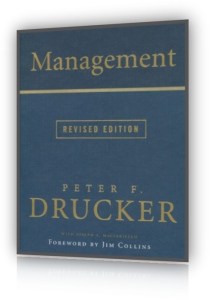 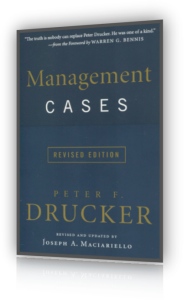
Amazon Links: Management Rev Ed and Management Cases, Revised Edition and Management Cases, Revised Edition
See contents of Management Cases, Revised Edition
Identifying the Future
Futurists always measure their batting average by counting how many things they have predicted that have come true.
They never count how many important things come true that they did not predict.
Everything a forecaster predicts may come to pass.
Yet, he may not have seen the most meaningful of the emergent realities or, worse still, may not have paid attention to them.
There is no way to avoid this irrelevancy in forecasting, for the important and distinctive are always the result of changes in values, perception, and goals, that is, in things that one can divine but not forecast.
But the most important work of the executive is to identify the changes that have already happened.
The important challenge in society, economics, politics, is to exploit the changes that have already occurred and to use them as opportunities.
The important thing is to identify the "future that has already happened"—and to develop a methodology for perceiving and analyzing these changes.
A good deal of this methodology is incorporated in my 1985 book Innovation and Entrepreneurship, which shows how one systematically looks to the changes in society, in demographics, in meaning, in science and technology, as opportunities to make the future.
Performance: The Test of Management
Achievement rather than knowledge remains both the proof and aim of management.
The ultimate test of management is performance.
Management, in other words, is a practice, rather than a science or profession, although containing elements of both.
No greater damage could be done to our economy or to our society than to attempt to professionalize management by licensing managers, for instance, or by limiting access to management positions to people with a special academic degree.
On the contrary, the test of good management is whether it enables the successful performer to do her work.
And any serious attempt to make management "scientific" or a "profession" is bound to lead to the attempt to eliminate those "disturbing nuisances," the unpredictabilities of business life—its risks, its ups and downs, its "wasteful competition," the "irrational choices" of the consumer—and in the process, the economy's freedom and its ability to grow.
Reinvent Yourself
Knowledge people must take responsibility for their own development and placement.
In today's society and organizations, people work increasingly with knowledge, rather than with skill.
Knowledge and skill differ in a fundamental characteristic—skills change very, very slowly.
Knowledge, however, changes itself.
It makes itself obsolete, and very rapidly.
A knowledge worker becomes obsolescent if he or she does not go back to school every three or four years.
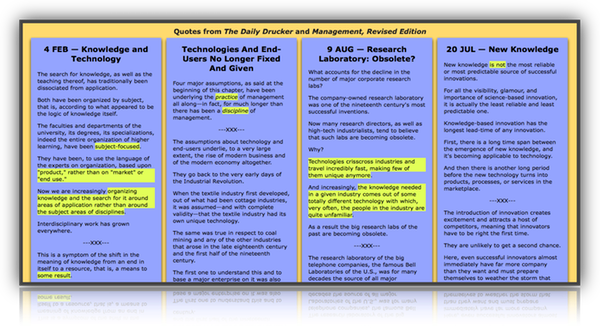
Larger
This not only means that the equipment of learning, of knowledge, of skill, of experience that one acquires early is not sufficient for our present life time and working time.
People change over such a long time span.
They become different persons with different needs, different abilities, different perspectives, and, therefore, with a need to "reinvent themselves."
I quite intentionally use a stronger word than "revitalize."
If you talk of fifty years of working life—and this, I think, is going to be increasingly the norm—you have to reinvent yourself.
You have to make something different out of yourself, rather than just find a new supply of energy.

Amazon link: The Daily Drucker: 366 Days of Insight and Motivation for Getting the Right Things Done
The cellular awareness (similar to animal instincts) of the relentless concepts (pressures, forces, propellants) underlying observable changes is the truly important harvest from this concept map and collection of attention directing tools.
Some of these changes completely displace yesterday (and today).
This awareness should be a motivator as well as a navigation aid. One motivation should be the desire to not be left behind or disadvantaged.
A dramatic change is the reality that our lives are no longer isolated by geographical distance. (The railroads mastered distance and e-commerce eliminates it.)
"Our complex and often cruel situation—navigating unimagined futures" for some additional thoughts on time. 

Some visual reminders can be seen at British Pathe digital news archive. There are links in the images above.
The First Technological Revolution and Its Lessons
A Century of Social Transformation
Steve Forbes comments on Forbes 400 Rich List
The Truth About Wealth
Google: "the sweep of history"
The second major harvest is the recurring inadequacy of our mental patterns and the need for some valid systematic work in this area. The usefulness of the tools is built into the situation.
If we live long enough, there are going to be multiple strategic unimagined futures for which adaptation alone is inadequate. Tactical unimagined events happen everyday (in sports, politics, world events). See stories from the news; my TLN blog or search Google News for: unexpected OR unforeseen OR unanticipated OR unimagined.
Within the changing social and economic picture are individual world views, mental patterns and life lines.
See about change and a knowledge system view. At any moment in time you could superimpose reports from the Census Bureau.
Mentally connect to the ideas of radar, model calendars and conceptual resources.
Peter Drucker: Conceptual Resources
The Über Mentor
A political / social ecologist
a different way of seeing and thinking about
the big picture
— lead to his top-of-the-food-chain reputation
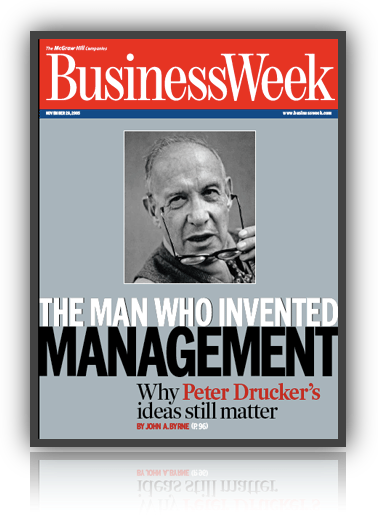
about Management (a shock to the system)
“I am not a ‘theoretician’; through my consulting practice I am in daily touch with the concrete opportunities and problems of a fairly large number of institutions, foremost among them businesses but also hospitals, government agencies and public-service institutions such as museums and universities.
And I am working with such institutions on several continents: North America, including Canada and Mexico; Latin America; Europe; Japan and South East Asia.” — PFD

List of his books
Large combined outline of Drucker’s books — useful for topic searching.

“High tech is living in the nineteenth century,
the pre-management world.
They believe that people pay for technology.
They have a romance with technology.
But people don't pay for technology:
they pay for what they get out of technology.” —
The Frontiers of Management
See links at the bottom of this page
Everything on this web site as well as the need for it is part of the concept on this page.
Conclusion: What do you want to be remembered for?
TLN keywords: tlnkwchange tlnkwtime tlnkwsituation
|
![]()
